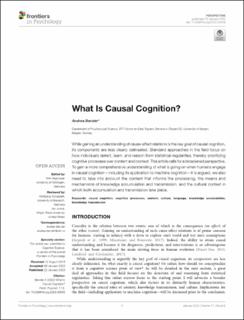What Is Causal Cognition?
Journal article, Peer reviewed
Published version

Åpne
Permanent lenke
https://hdl.handle.net/11250/2729662Utgivelsesdato
2020Metadata
Vis full innførselSamlinger
Sammendrag
While gaining an understanding of cause-effect relations is the key goal of causal cognition, its components are less clearly delineated. Standard approaches in the field focus on how individuals detect, learn, and reason from statistical regularities, thereby prioritizing cognitive processes over content and context. This article calls for a broadened perspective. To gain a more comprehensive understanding of what is going on when humans engage in causal cognition—including its application to machine cognition—it is argued, we also need to take into account the content that informs the processing, the means and mechanisms of knowledge accumulation and transmission, and the cultural context in which both accumulation and transmission take place.
